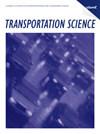Physics-Informed Machine Learning for Calibrating Macroscopic Traffic Flow Models
IF 4.8
2区 工程技术
Q1 OPERATIONS RESEARCH & MANAGEMENT SCIENCE
引用次数: 0
Abstract
Well-calibrated traffic flow models are fundamental to understanding traffic phenomena and designing control strategies. Traditional calibration has been developed based on optimization methods. In this paper, we propose a novel physics-informed, learning-based calibration approach that achieves performances comparable to and even better than those of optimization-based methods. To this end, we combine the classical deep autoencoder, an unsupervised machine learning model consisting of one encoder and one decoder, with traffic flow models. Our approach informs the decoder of the physical traffic flow models and thus induces the encoder to yield reasonable traffic parameters given flow and speed measurements. We also introduce the denoising autoencoder into our method so that it can handle not only with normal data but also corrupted data with missing values. We verified our approach with a case study of Interstate 210 Eastbound in California. It turns out that our approach can achieve comparable performance to the-state-of-the-art calibration methods given normal data and outperform them given corrupted data with missing values.History: This paper has been accepted for the Transportation Science Special Issue on ISTTT25 Conference.Funding: This study was supported by the National Science Foundation [Grant CMMI-1949710] and the C2SMART Research Center, a Tier 1 University Transportation Center.利用物理信息机器学习校准宏观交通流模型
校准良好的交通流模型是理解交通现象和设计控制策略的基础。传统的标定方法是基于优化方法开发的。在本文中,我们提出了一种新颖的基于学习的物理信息校准方法,其性能可媲美甚至优于基于优化的方法。为此,我们将经典的深度自动编码器(一种由一个编码器和一个解码器组成的无监督机器学习模型)与交通流模型相结合。我们的方法将物理交通流模型告知解码器,从而诱导编码器根据流量和速度测量结果生成合理的交通参数。我们还在方法中引入了去噪自动编码器,使其不仅能处理正常数据,还能处理缺失值的损坏数据。我们以加利福尼亚州 210 号州际公路东行线为例,验证了我们的方法。结果表明,在正常数据条件下,我们的方法可以达到与最先进的校准方法相当的性能,而在有缺失值的损坏数据条件下,我们的方法则优于它们:本文已被 ISTTT25 会议交通科学专刊录用:本研究得到了美国国家科学基金会 [CMMI-1949710] 和一级大学交通中心 C2SMART 研究中心的支持。
本文章由计算机程序翻译,如有差异,请以英文原文为准。
求助全文
约1分钟内获得全文
求助全文
来源期刊

Transportation Science
工程技术-运筹学与管理科学
CiteScore
8.30
自引率
10.90%
发文量
111
审稿时长
12 months
期刊介绍:
Transportation Science, published quarterly by INFORMS, is the flagship journal of the Transportation Science and Logistics Society of INFORMS. As the foremost scientific journal in the cross-disciplinary operational research field of transportation analysis, Transportation Science publishes high-quality original contributions and surveys on phenomena associated with all modes of transportation, present and prospective, including mainly all levels of planning, design, economic, operational, and social aspects. Transportation Science focuses primarily on fundamental theories, coupled with observational and experimental studies of transportation and logistics phenomena and processes, mathematical models, advanced methodologies and novel applications in transportation and logistics systems analysis, planning and design. The journal covers a broad range of topics that include vehicular and human traffic flow theories, models and their application to traffic operations and management, strategic, tactical, and operational planning of transportation and logistics systems; performance analysis methods and system design and optimization; theories and analysis methods for network and spatial activity interaction, equilibrium and dynamics; economics of transportation system supply and evaluation; methodologies for analysis of transportation user behavior and the demand for transportation and logistics services.
Transportation Science is international in scope, with editors from nations around the globe. The editorial board reflects the diverse interdisciplinary interests of the transportation science and logistics community, with members that hold primary affiliations in engineering (civil, industrial, and aeronautical), physics, economics, applied mathematics, and business.
 求助内容:
求助内容: 应助结果提醒方式:
应助结果提醒方式:


